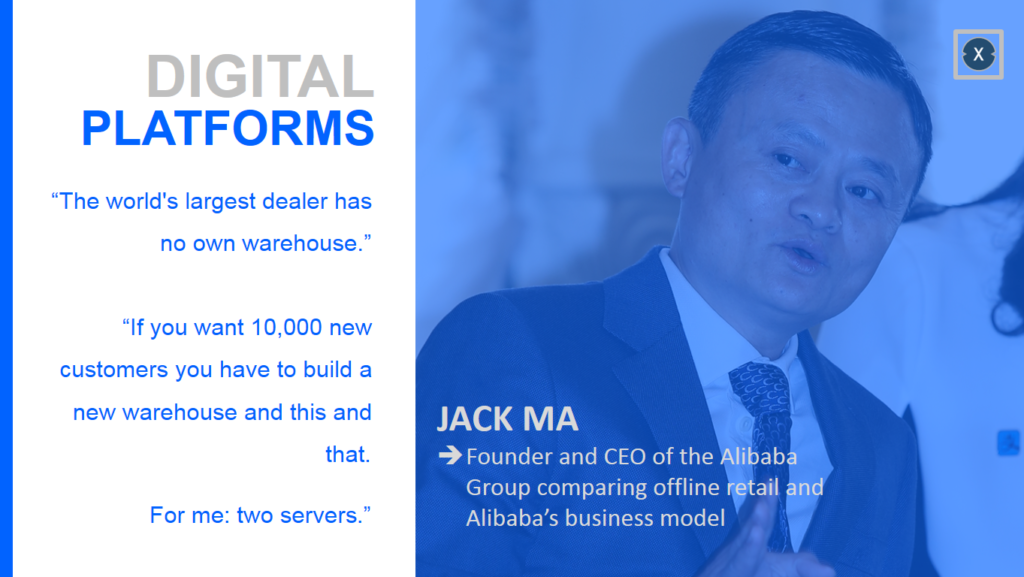The global economy is booming, and most companies are enjoying full order books. However, this growth isn't uniformly rapid across all sectors. For the past few years, IT companies that have undergone digital transformation have been particularly successful, benefiting from above-average growth. Often, they don't own their own machinery or other physical production factors, but rather derive their strength from facilitating services between suppliers and customers. Their efficient performance is based on powerful platforms through which users exchange services. E-commerce giants like Amazon and Alibaba are prime examples, being among the biggest developers and beneficiaries of the platform economy. This economy has the potential to fundamentally transform the economy of tomorrow. Those who fail to adapt risk being left behind.
Why the platform economy will prevail
- Want some figures?
There are now around 500 different digital platforms worldwide, with annual growth rates of 20 percent and more. - The 60 most valuable platforms are worth approximately seven trillion dollars. All platform companies combined have a total value of over eight billion dollars
- The seven largest B2C platforms have a greater value than all the stocks in the Euro Stoxx 50 combined
- Amazon is the second company after Apple to break the trillion-dollar mark in terms of value
- While the top 10 platforms gain almost 20% per year, the top 10 of the German DAX only manage about 10%
Digital platforms distributed across all industries
Platform economy players are active in virtually every industry. Their rise began in the 1990s with e-commerce marketplaces like Amazon and eBay. Later came Facebook, Airbnb, Uber, Spotify, and other former startups that are now valued in the tens of billions and more. Their reach extends beyond B2C to include a wide range of B2B sectors. These include trading platforms like Alibaba, industry-specific B2B networks such as SAP Ariba and Wucato, and freelance platforms like Upwork, which connect businesses with all kinds of services.
The lack of any production capacity is their greatest advantage over traditional industrial and service corporations, because since their business is based solely on digital data, they can scale their business model much faster. Independent of actual production costs, they earn a typically double-digit percentage on every single transaction processed on their platform and also generate substantial revenue from advertising placed on their sites by market participants.
If problems arise, they can more easily adapt the model, its content, and direction as needed, whereas a manufacturing company faces very high investments and project durations when changing its strategy. It's no wonder, then, that financial analysts believe they have a greater chance of decisively shaping the markets in their respective sectors in the future.
How the platforms are outperforming traditional providers – two examples
Mobility: Traditional car rental companies like Hertz, Avis, or Europcar have to maintain hundreds of thousands of vehicles globally to offer their customers comprehensive service. This results in billions of dollars in tied-up capital for these vehicles, whose value decreases with each passing day and every kilometer driven. In contrast, ride-hailing services like Uber or Lyft don't own their own fleets of vehicles but instead profit from commissions on every ride they arrange. The stock market reflects this, valuing Uber, for example, at around $75 billion, while a rental company like Europcar is valued at only $2 to $3 billion.
Hotel industry: Chains like Marriott and Hilton maintain literally millions of rooms worldwide, with corresponding fixed and ongoing costs. In contrast, platform providers like Airbnb, despite a comparable number of rooms, do not operate a single hotel. Yet Airbnb's market capitalization is higher than that of Hilton, for example.
Europe is lagging behind in development
Platform operators from the US and China, especially the multi-billion-dollar Silicon Valley companies, are the main beneficiaries of this success. US firms dominate the platform world with a 67% share (based on company value), followed by Asia with 30%. China, in particular, is rapidly catching up, as it is the location where most new platform models, especially in the B2B sector, are being developed. Europe's share of this booming business? A shockingly meager 3%.
How much this future trend still uncharted territory for many in Germany is demonstrated by a Bitkom study from January 2018, which surveyed 505 companies with more than 20 employees. 54% of respondents stated that they had never heard the term "digital platform ." These are hardly signs that point to an imminent catch-up for the German economy. However, a rapid change in thinking is necessary, because these platforms threaten the traditional business models of established companies.
The challenges for traditional manufacturers are significant, but this step is unavoidable, as the platform economy is shifting essential value creation components to the digital economy, changing or even replacing entire business areas. Many, however, are already struggling with the completely different know-how requirements compared to their core business. But the effort can pay off, as the demand for platforms is increasing, particularly in the B2B sector. The following models conceivable:
- Focus on the shared use of resources, capacities, and know-how – suitable for companies in overlapping industries. Prerequisite: Allowance of a minimum level of knowledge transfer between participants
- Focus on a cooperation platform where the products and services of the participants complement each other (horizontal or vertical cooperations) to offer added value to customers
- Focus on digital data and technologies – partners share their data (e.g., from production, purchasing, or logistics) for joint use and analysis to increase know-how and optimize workflows
Depending on their level of knowledge and market power, the companies in question can choose whether to
- build your own platform model (for innovators and first movers)
- Build a platform with other partners (if greater market power and importance are expected with partners)
- Expand existing platforms for cooperation or as an additional sales channel
Applications in logistics
The logistics industry is ideally suited for platform models of all kinds. These include spot marketplaces, eForwarders, and SCM platforms. Many companies are currently focusing on establishing shipping platforms. Logistics startups like Shipcloud offer their customers an interface to shipping providers such as DHL or UPS, allowing them to process their shipments without the platform itself putting a single truck on the road. Similar services exist for international freight logistics (Freightos) or the cost-effective organization of sea freight (Flexport).
the next big thing with a platform that offers clear added value . Many are wondering, after all, why there isn't yet a business model for parcel delivery comparable to Uber, for example.
As the volume of goods transported worldwide is expected to increase further in the future, the demand for cost-effective platforms to support this is growing. Therefore, the smooth organization of goods flows is essential, and this will hardly be possible in the future without networked communication, real-time data exchange, and analysis.
The boundaries between industries like retail – whether e-commerce, omnichannel, or unified commerce – and logistics are increasingly blurring. Large platforms like Amazon or Zalando have long since begun providing their retailers with logistics infrastructure so that goods can be stored cost-effectively and reach customers quickly.
Offer, visibility and transparency
In this promising market, established market leaders have an advantage, but small companies are not without a chance. To compete with the big players, small logistics providers specializing in transport, warehousing, and fulfillment could, for example, form platforms together with manufacturers of the necessary hardware and software. These platforms would offer customers one-stop services at the best possible rates. Sharedload.com, where shippers post transport orders and receive corresponding offers from logistics providers (and vice versa), is just one example of such collaborative platform models. This kind of booking.com for logistics services certainly presents a great opportunity for platforms.
In addition to a comprehensive range of products and services, a detailed overview, and transparency, customers can also find feedback on the reliability of each supplier through customer reviews. For suppliers, the platform offers the further advantage of better capacity utilization and the ability to acquire new customers. Platform operators who succeed in creating visibility and transparency for both buyers and sellers have a strong chance of successfully implementing the platform economy in logistics. The more suppliers, retailers, and manufacturers are active on the platform, the greater the volume of transactions and, consequently, the higher the commission-based revenue.


